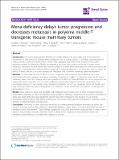| dc.contributor.author | Roussos, Evanthia T. | |
| dc.contributor.author | Wang, Yarong | |
| dc.contributor.author | Wyckoff, Jeffrey B. | |
| dc.contributor.author | Sellers, Rani S. | |
| dc.contributor.author | Wang, Weigang | |
| dc.contributor.author | Li, Jiufeng | |
| dc.contributor.author | Pollard, Jeffrey W. | |
| dc.contributor.author | Gertler, Frank | |
| dc.contributor.author | Condeelis, John S. | |
| dc.date.accessioned | 2011-09-12T21:02:30Z | |
| dc.date.available | 2011-09-12T21:02:30Z | |
| dc.date.issued | 2010-11 | |
| dc.date.submitted | 2010-11 | |
| dc.identifier.issn | 1465-5411 | |
| dc.identifier.issn | 1465-542X | |
| dc.identifier.uri | http://hdl.handle.net/1721.1/65653 | |
| dc.description.abstract | Introduction
The actin binding protein Mammalian enabled (Mena), has been implicated in the metastatic progression of solid tumors in humans. Mena expression level in primary tumors is correlated with metastasis in breast, cervical, colorectal and pancreatic cancers. Cells expressing high Mena levels are part of the tumor microenvironment for metastasis (TMEM), an anatomical structure that is predictive for risk of breast cancer metastasis. Previously we have shown that forced expression of Mena adenocarcinoma cells enhances invasion and metastasis in xenograft mice. Whether Mena is required for tumor progression is still unknown. Here we report the effects of Mena deficiency on tumor progression, metastasis and on normal mammary gland development. Methods
To investigate the role of Mena in tumor progression and metastasis, Mena deficient mice were intercrossed with mice carrying a transgene expressing the polyoma middle T oncoprotein, driven by the mouse mammary tumor virus. The progeny were investigated for the effects of Mena deficiency on tumor progression via staging of primary mammary tumors and by evaluation of morbidity. Stages of metastatic progression were investigated using an in vivo invasion assay, intravital multiphoton microscopy, circulating tumor cell burden, and lung metastases. Mammary gland development was studied in whole mount mammary glands of wild type and Mena deficient mice. Results
Mena deficiency decreased morbidity and metastatic dissemination. Loss of Mena increased mammary tumor latency but had no affect on mammary tumor burden or histologic progression to carcinoma. Elimination of Mena also significantly decreased epidermal growth factor (EGF) induced in vivo invasion, in vivo motility, intravasation and metastasis. Non-tumor bearing mice deficient for Mena also showed defects in mammary gland terminal end bud formation and branching. Conclusions
Deficiency of Mena decreases metastasis by slowing tumor progression and reducing tumor cell invasion and intravasation. Mena deficiency during development causes defects in invasive processes involved in mammary gland development. These findings suggest that functional intervention targeting Mena in breast cancer patients may provide a valuable treatment option to delay tumor progression and decrease invasion and metastatic spread leading to an improved prognostic outcome. | en_US |
| dc.description.sponsorship | National Cancer Institute (U.S.). Integrative Cancer Biology Program (grant U54 CA112967) | en_US |
| dc.description.sponsorship | Virginia and D.K. Ludwig Fund for Cancer Research | en_US |
| dc.language.iso | en_US | |
| dc.publisher | BioMed Central Ltd. | en_US |
| dc.relation.isversionof | http://dx.doi.org/10.1186/bcr2784 | en_US |
| dc.rights | Creative Commons Attribution | en_US |
| dc.rights.uri | http://creativecommons.org/licenses/by/2.0/ | en_US |
| dc.source | BMC | en_US |
| dc.title | Mena deficiency delays tumor progression and decreases metastasis in polyoma middle-T transgenic mouse mammary tumors | en_US |
| dc.type | Article | en_US |
| dc.identifier.citation | Roussos, Evanthia T et al. “Mena deficiency delays tumor progression and decreases metastasis in polyoma middle-T transgenic mouse mammary tumors.” Breast Cancer Research 12 (2010): R101. | en_US |
| dc.contributor.department | Massachusetts Institute of Technology. Department of Biology | en_US |
| dc.contributor.department | Koch Institute for Integrative Cancer Research at MIT | en_US |
| dc.contributor.approver | Gertler, Frank | |
| dc.contributor.mitauthor | Gertler, Frank | |
| dc.relation.journal | Breast Cancer Research | en_US |
| dc.eprint.version | Final published version | en_US |
| dc.type.uri | http://purl.org/eprint/type/JournalArticle | en_US |
| eprint.status | http://purl.org/eprint/status/PeerReviewed | en_US |
| dspace.orderedauthors | Roussos, Evanthia T; Wang, Yarong; Wyckoff, Jeffrey B; Sellers, Rani S; Wang, Weigang; Li, Jiufeng; Pollard, Jeffrey W; Gertler, Frank B; Condeelis, John S | en |
| dc.identifier.orcid | https://orcid.org/0000-0003-3214-4554 | |
| mit.license | PUBLISHER_CC | en_US |
| mit.metadata.status | Complete | |
